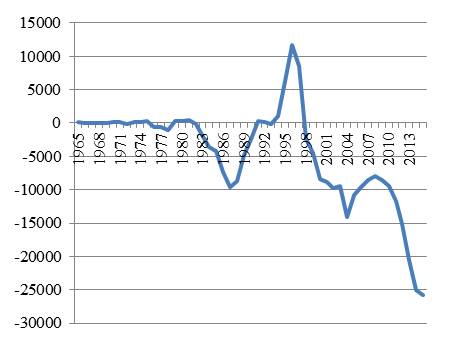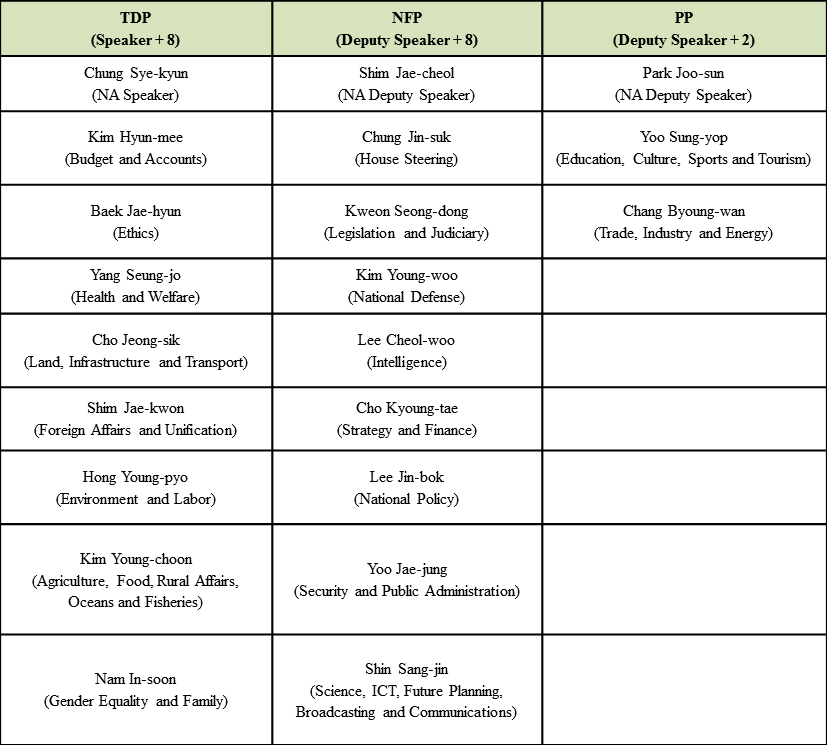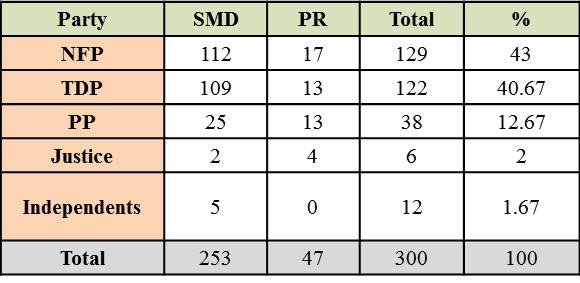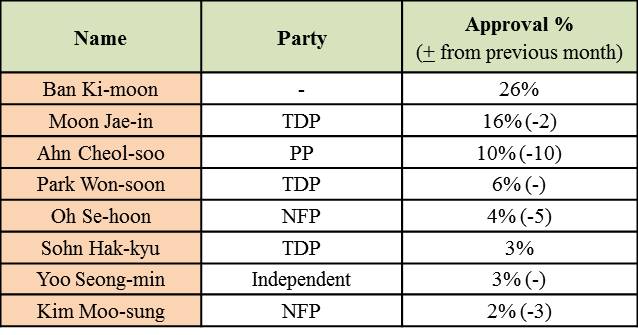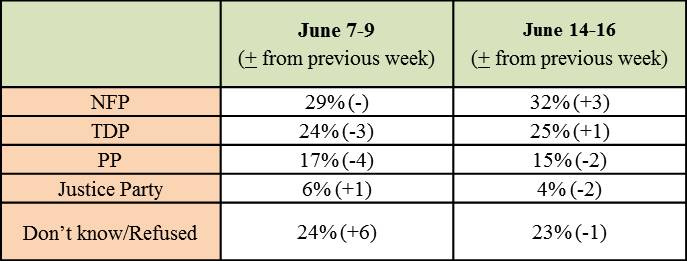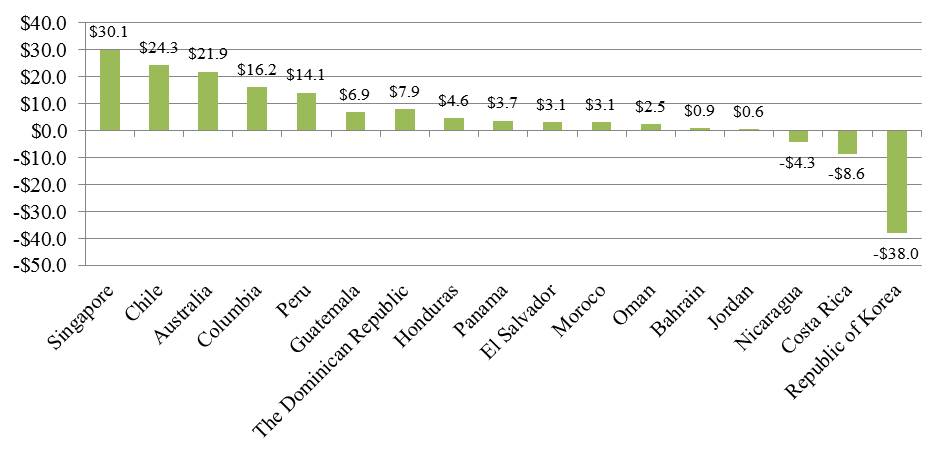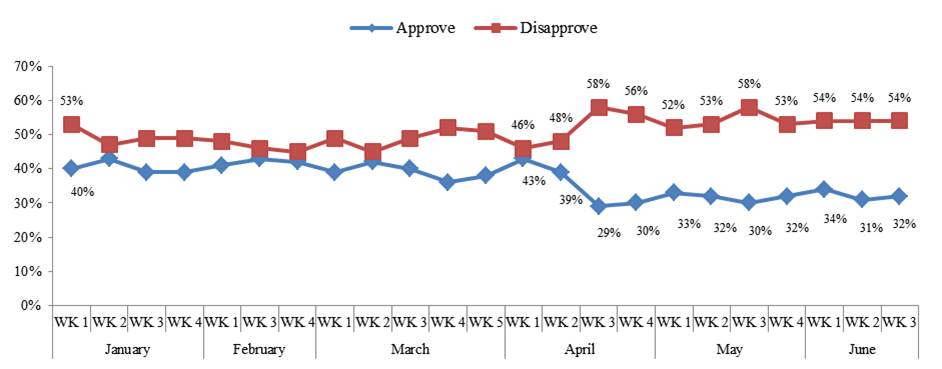KORUS FTA
Concerns were raised about the implementation of the Korea-US Free Trade Agreement (KORUS FTA) when US Ambassador Mark Lippert described the Korean business environment as “not easy.” Citing the legal service market as an example, he urged Korea to work towards a “complete fulfillment of the free trade deal [between Korea and the US].”1 He also emphasized the need for more deregulation (e.g. regulation of car seat size) as he lamented the possibility of Korea’s loss of appeal to foreign companies.2
US Trade Balance with South Korea, 1965-2015
(in USD Mil)
A recent report by Korea Trade-Investment Promotion Agency (KOTRA) confirms growing American dissatisfaction with the implementation of the KORUS FTA.3 One concern is the growing bilateral trade deficit. Among the 17 FTAs that the US has concluded since NAFTA, KORUS FTA ranks the lowest in terms of trade balance (See below).
The 20th National Assembly
Major party leaders agreed on June 8 that the Together Democratic Party (TDP) should hold the speakership of the 20th National Assembly. A six-term TDP National Assemblyman, Chung Sye-kyun, was elected to be the Speaker during a plenary session on June 9.4 This marks the first time since 2002 that an opposition lawmaker has been named as the Speaker of the National Assembly. Shim Jae-cheol from the New Frontier Party (NFP) and Park Joo-sun from the People’s Party (PP) were chosen as the Deputy Speakers.
In exchange for yielding the speakership, the ruling NFP will chair eight committees, including the House Steering Committee and the Legislation and Judiciary Committee. The TDP will also chair eight committees, and the PP, two committees.5
Leadership on the Floor and Committees
Intraparty Factionalism
The ruling NFP reinstated seven ex-NFP independents on June 16 after a secret ballot.6 The decision was made by the party’s interim leadership, headed by Kim Hee-ok. Pro-Park NFP members argued that this decision should not have been handled by a secret ballot.7 The Blue House has yet to make an official statement.8 If the decision stands, the NFP will reclaim its status as the largest party in the National Assembly.9
Composition of NA
(with reinstatement of 7 ex-NFP Members)
Presidential Candidates Approval Ratings10
Recapitalization Fund
The government and the Bank of Korea (BoK) agreed to establish a recapitalization fund worth KRW 11 trillion. Under this arrangement, the BoK will provide KRW 10 trillion and the Korea Asset Management Corporation (KAMCO), KRW 1 trillion. The Industrial Bank of Korea (IBK) functions as a pass-through entity and the Korea Credit Guarantee Fund (KODIT) will guarantee the BoK loan.13 Skeptics criticized the latest move by suggesting that the bailout is an excessive use of public finance and falls short of necessary reforms.14
Functional Adjustment of Public Entities
Yoo Il-ho, the Deputy Prime Minister and the Minister of Strategy and Finance, announced “the framework for functional adjustment of state-owned enterprises in energy, environment, and education” on June 13.15 The latest announcement came as part of an ongoing effort to “normalize public entities,”16 with focus on the energy sector, which suffers from huge debt and inefficiencies.
The government outlined four objectives: i) unify overlapping businesses dispersed across different organizations; ii) reduce debt and size of non-core business functions; iii) open mono/oligopolistic public sectors to private investors; and iv) improve financial transparency.
The plan calls for downsizing the Korea Coal Corporation (KOCOAL) and the Korea Resource Corporation (KORES). Korea National Oil Corporation (KNOC) and Korea Gas Corporation (KOGAS) are to sell non-core business assets. Ultimately, overseas resource development function of KORES will be moved to KNOC and KOGAS, while their existing portfolio will also be reduced. Under the current arrangement, both the electricity and gas markets should be opened to private retailers. Details are to be released in the months ahead.17
Eight corporations – Korea Electric Power Corporation (KEPCO)’s five daughter companies, Korea Hydro & Nuclear Power (KHNP), KEPCO KDN, and Korea Gas Technology Corporation (KOGAS-Tech) –are to be publicly traded as of 2017. Labor unions opposed the measure calling it a step toward privatization, but the government maintained that it will be the majority shareholder with control of more than 50% of the total stock offering. Precedents suggest that this move may not be easy. In 2001, the government divided KEPCO’s electricity generation business into 6 companies and tried to list the Korea South-East Power Company on the public market. However, the attempt failed due to a large gap in the government and the market’s offering price.18
Energy companies came under serious scrutiny for recording huge losses after failed investments in overseas energy resources during the Lee Myung-bak presidency. The government’s short-sighted energy policies have been criticized for making investments when commodity prices were high and sold when prices were low.19
Changes in US Trade Balance 3 Years Before and After
Implementation of FTA (unit: $ 1 billion)
Rate of Increase in US Trade Deficit (unit: $1 million)
President Park’s Approval Rating
Contributing Staff(in alphabetical order): Han Minjeong, J. James Kim, John J. Lee
Editorial Staff:J. James Kim
* Special thanks to Jo Eun A for her comments and feedback.
-
1.
“리퍼트 美대사 ‘한국서 사업 어려워… FTA 완전한 이행 필요’,” 동아일보, 2016년 6월 2일.
-
2.
“리퍼트가 지적한 ‘車 좌석넓이 규제’… 54년간 소형차 개발 가로막은 주범,” 문화일보, 2016년 6월 2일.
-
3.
Document available here (in Korean): http://www.globalwindow.org/gw/publishdata/GWPDIN020M.html?BBS_ID=30&MENU_CD=M10503&UPPER_MENU_CD=M10501&MENU_STEP=2&ARTICLE_ID=5037701.
-
4.
“더민주 정세균, 20대 국회 전반기 국회의장에 선출,” 한겨레, 2016년 6월 9일.
-
5.
“여야 3당, 원 구성 합의,” 경향신문, 2016년 6월 9일.
-
6.
“새누리당, 유승민 윤상현 등 7인 일괄복당 결정,” 중앙일보, 2016년 6월 16일.
-
7.
“與 친박계, 유승민 복당에 반발,” 조선일보, 2016년 6월 16일; “유승민 복당… ‘쿠데타’ 반발한 親朴,” 조선일보, 2016년 6월 17일.
-
8.
“청화대, 유승민 복당에 이틀째 공식 침묵,” 중앙일보, 2016년 6월 17일.
-
9.
Chung Sye-kyun, the NA speaker, surrendered his affiliation with TDP in compliance with NA rule.
-
10.
Date: June 7-9; sample size: 1,002; margin of error: +3.1 at the 95% confidence level.
-
11.
Date: June 7-9; sample size: 1,002; margin of error: +3.1 at the 95% confidence level
-
12.
Date: June 14-16; sample size: 1,001; margin of error: +3.1 at the 95% confidence level.
-
13.
“구조조정 실탄, 韓銀이 10兆 정부가 2兆 댄다,” 조선일보, 6월 9일.
-
14.
“정책금융 수술은 빠진 구조조정 대책,” 중앙일보, 2016년 6월 10일; “차기정권에 조선·해운 부실폭탄 돌리는게 구조조정인가,” 동아일보, 2016년 6월 9일.
-
15.
“기능조정 보도자료,” 기획재정부, 2016년 6월 13일.
- 16.
-
17.
“55년만에 깨지는 韓電 독점…전기료 상승 막는 게 숙제,” 조선일보, 2016년 6월 15일.
-
18.
“‘공모가 이견’ 남동발전 실패 전철 가능성,” 경향신문, 2016년 6월 14일.
-
19.
“MB땐 48조 올인, 이번엔 메스…정권따라 냉온탕 자원개발,” 중앙일보, 2016년 6월 15일.

 Facebook
Facebook Twitter
Twitter